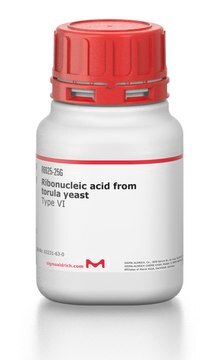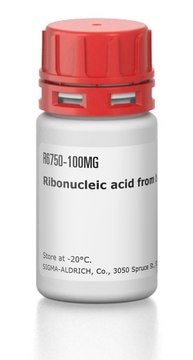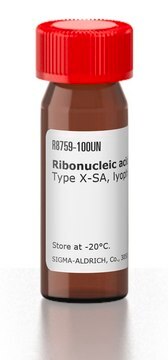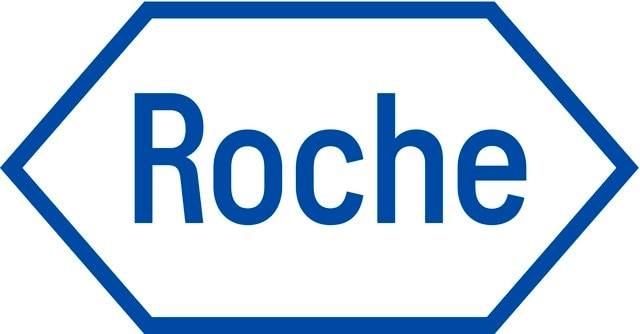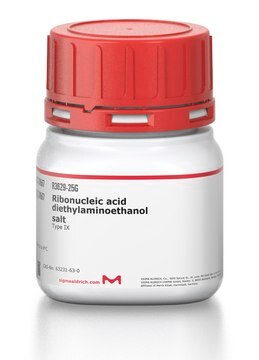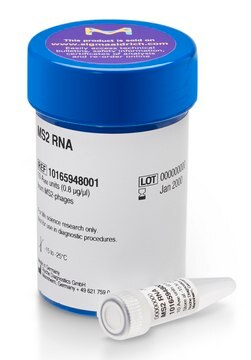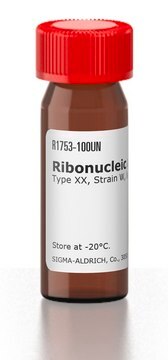R6875
Ribonukleinsäure aus Torulahefe
core, Type II-C
Synonym(e):
RNA
Anmeldenzur Ansicht organisationsspezifischer und vertraglich vereinbarter Preise
Alle Fotos(1)
About This Item
Empfohlene Produkte
Suchen Sie nach ähnlichen Produkten? Aufrufen Leitfaden zum Produktvergleich
Anwendung
Ribonucleic acid (RNA) from torula yeast may be used as a substrate for studying ribonuclease activities of enzymes such as ribonuclease-A, ribonuclease T1 (RNAase) and bougainvillea xbuttiana antiviral protein 1 (BBAP1).
Lagerklassenschlüssel
11 - Combustible Solids
WGK
WGK 3
Flammpunkt (°F)
Not applicable
Flammpunkt (°C)
Not applicable
Persönliche Schutzausrüstung
Eyeshields, Gloves, type N95 (US)
Analysenzertifikate (COA)
Suchen Sie nach Analysenzertifikate (COA), indem Sie die Lot-/Chargennummer des Produkts eingeben. Lot- und Chargennummern sind auf dem Produktetikett hinter den Wörtern ‘Lot’ oder ‘Batch’ (Lot oder Charge) zu finden.
Besitzen Sie dieses Produkt bereits?
In der Dokumentenbibliothek finden Sie die Dokumentation zu den Produkten, die Sie kürzlich erworben haben.
Kunden haben sich ebenfalls angesehen
Ribonuclease, deoxyribonuclease, and antiviral activity of Escherichia coli-expressed Bougainvillea xbuttiana antiviral protein 1.
Choudhary NL, Yadav OP, Lodha ML.
Biochemistry. Biokhimiia, 73, 173-177 (2008)
J Steyaert et al.
Biochemistry, 30(35), 8661-8665 (1991-09-03)
We report on the effect of the viscogenic agents glycerol and ficoll on the RNase T1 catalyzed turnover of GpA, GpC, GpU, and Torula yeast RNA. For wild-type enzyme, we find that the kcat/Km values for the transesterification of GpC
H Yanagawa et al.
Nucleic acids symposium series, 25(25), 113-114 (1991-01-01)
Three nucleosides catalyzing the oxidoreduction of NADH and K3Fe(CN)6 were isolated from Torula yeast RNA and also obtained by a series of steps: SDS-phenol extraction, nuclease P1 digestion, alkaline phosphatase digestion, anion exchange chromatography, and HPLC on an ODS column.
Toru Miyamoto et al.
Biotechnology progress, 25(6), 1678-1685 (2009-09-03)
Ribonuclease (RNase), which often represents molecular biological contamination, is a thermostable enzyme. When RNase is heated at 121 degrees C by autoclave sterilization for 20 min, it does not lose its activity. However, the nature of the molecular events by
Abstracts of Albany 2013: the 18th Conversation. June 11-18, 2013. Albany, New York, USA.
Journal of biomolecular structure & dynamics, 31 Suppl 1, 1-139 (2013-06-06)
Unser Team von Wissenschaftlern verfügt über Erfahrung in allen Forschungsbereichen einschließlich Life Science, Materialwissenschaften, chemischer Synthese, Chromatographie, Analytik und vielen mehr..
Setzen Sie sich mit dem technischen Dienst in Verbindung.